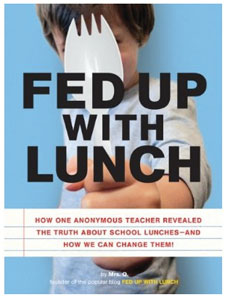How many times have any of us ever forgotten our lunch? It’s a pretty mundane event, we either skip or find a plan B and move on with our day. For Sarah Wu, it was not a common occurrence to leave her lunch at home. Making lunches for she and her toddler son was a part of her routine. However, one fateful day she did forget her lunch and what happened after that changed her life.
Sarah is a speech pathologist for Chicago Public Schools, and in 2026 she was working in one of the largest and poorest schools in the city (she remains there today). She forgot her lunch, but felt a little relief because for three dollars she could walk to the cafeteria and pick up that day’s hot plate. She admits to having ” a minimal understanding of food and scratch cooking” but upon receiving her school lunch that fateful day, she said “I knew there was something wrong with that meal.”
It was a bagel dog, a hot dog encased in a starchy white bagel crust, that was pretty soggy. This was served with a handful of tater tots (which qualifies as a vegetable serving), a Jell-O cup (a qualified fruit serving), and a chocolate milk. Almost immediately Sarah became “Fed Up With Lunch,” the title of her blog-turned-book in which she “outs” the goings on of the school cafeteria and how our children are being fed nothing more than processed, chemical junk.
“I didn’t think there was much I could do,” Wu told us, who took on the pen name “Mrs. Q” to protect her fragile anonymity. She agonized for weeks over what she was seeing at school before she finally started her Fed Up With Lunch blog, where she committed to eating lunch in the school cafeteria every day for an entire school year. She photographed the meals each day, all of which are shared in a photo insert in the book, and wrote about what she was served, what she was learning about the school food industry, and even the effects she was seeing on her students as a result of these meals.
While her blood pressure and cholesterol were slightly affected by the meals, she says “I didn’t get fat!”, a question she is often asked. To counter the foods she was forcing herself to eat at school, she went to the other extreme at home being diligent about serving healthful meals to her husband, son, and self.
She told us about the “spaced-out look in speech group after lunch” that her students had always donned, and expressed her frustration with trying to teach to students who had faded out. It made her question the role these nutritionally-void meals were playing. In our interview and in the book, she describes how these students have a total of 20 minutes to line-up, be served, eat, and return to the classroom (their school does not have a recess). It’s hardly enough time to eat, much less get through that checklist, and her students know it. Most kids will slurp the juice out of a fruit cup, guzzle their chocolate milk, and drop their uneaten meal back in the trash. Five minutes to inhale a couple of processed-sugar products and return to class without any play time isn’t doing these kids any favors.
Wu told us that for Chicago Public Schools, the school lunch contract expires this year and is up for re-negotiation. Her school also has one of the shortest school years in the country, 162 days versus the national average of 180. “We have a unique opportunity to change the day next year,” she says, hoping to add more days and extend the length of the school day to allow more time for teaching, eating, and playing.
She also advises everyone to get involved with the schools in their community, whether as a concerned citizen, or as a parent of a student. She says starting with a simple letter to the principal is a valuable way to express your concern and even make suggestions for change.
In Fed Up With Lunch you’ll learn a lot about how one person who shares their voice can impact change. People who may not have ever known how greatly the school lunch program has degraded are being let in on a well-kept secret that is long-overdue for some major changes.
